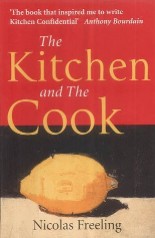
The Kitchen
Nicolas Freeling
177 pages
published in 1970
We were watching the Dutch version of one of those restaurant makeover shows, you know the ones, where some top chef goes into a kitchen of a failing restaurant, bullies the staff and turns it around when Sandra recommended this book to me. And since I knew that I was going to finish the book I was reading on my daily commute the next day, I thought why not. Her recommendations may not always be to my liking but they hit the mark more often than not.
Nicolas Freeling is one of those authors who used to be popular but have sort of slid into gentle obscurity; Sandra is a fan of his Van der Valk series of novels about a Dutch police detective, later turned into a popular British television series. I haven't read any of these yet, but Sandra has a lot of them in her detectives library. Before he became a fulltime writer however, he was a hotel cook, at a time when many of the grand old-fashioned hotels still existed, before changing tastes and changing markets destroyed them all. The Kitchen is his way of remembering them, of showing what really went on behind the scenes in the kitchen of a grand hotel.
And he did that so well that years later he would inspire Anthony Bourdain to write a similar book about his experiences of being a cook, a book you may have heard of called Kitchen Confidental. Not to mention that he got high praise from M. F. K. Fisher, who is apparantely the goddes of food writing. Freeling himself was inspired by Ludwig Bemelmans, another food writer who Sandra is pushing me to read (she likes food writing a lot more than I do).
It's not hard to see why people like this book. Freeling is very good at getting across what it was like working in those grand hotel kitchens, still run according to the system, the method of running a kitchen which wasted nothing except the sweat of its cooks. It's clear Freeling loved these sort of kitchens, while knowing its faults well. Some of his descriptions of what went on in the kitchens he worked in rival Orwell's descriptions of his work as a waiter in Down and Out in Paris and London. Especially in the second rate hotels Freeling would work in later, the system became a way of using up food that perhaps shouldn't have been used, cutting corners to stay in business you might not wanted cut. Thing is, the food may have been secondrate, but with enough good sauce and presentation it would still sell...
This is not a grossout book however, just a honest portrayal of a style of kitchen now gone, mixing his personal recollections with explenations of how they worked and what everybody in them did. That may strike you as very dull, but Freeling has the knack of explaining these things very very well and with some not inconsidarable humour. Now I don't know about you but I'm always happy to read any professional explaining their work and the secrets of their trade, no matter what it is. Because, let's face it, a lot of what we do is our work, yet the pleasure of doing work you enjoy and teaching others about it is one of the pleasures that is not often described in literature.
The Kitchen then is an excellent book even if, like me, you only have a passing interest in culinary matters. In the edition the cover of which is pictured above it comes bundled with its followup, The Cook, which is also recommended.
Read more about:
Nicolas Freeling,
The Kitchen,
gastronomy,
book review